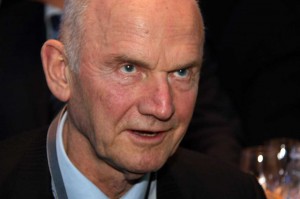
Volkswagen "will not be pushed" into a marriage with Porsche. Behind the scenes, the dispute may reflect a familial squabble with Ferdinand Piech, a Porsche heir and senior VW board member.
Saying he “will not be pushed” into hastily hammering out a merger with the smaller Porsche, Volkswagen CEO Martin Winterkorn has postponed a meeting between the two companies scheduled for today.
Porsche is downplaying the delay, insisting that other meetings with VW are still going ahead, “in a normal manner,” according to a statement on its website. But a spokesman for VW, in Europe, said that there are no further talks planned, for the moment.
Citing the need for “full transparency,” Winterkorn stressed that he does not want to “risk Volkswagen’s financial stability and sovereignty,” with a hastily-arranged corporate marriage. In a letter to the automaker’s employees, first obtained by the Associated Press, Winterkorn said that, “For any association between Volkswagen and Porsche, we have to systematically analyze the position of Porsche in order to get a clear picture of the real situation.”
 While Porsche has been able to boast one of the world’s largest profit margins, it has also run up a huge debt load. At $12 billion, it would weigh heavily on even a larger company like VW, analysts warn. Most of that debt has been accumulated in the takeover attempt that was set in motion last year.
While Porsche has been able to boast one of the world’s largest profit margins, it has also run up a huge debt load. At $12 billion, it would weigh heavily on even a larger company like VW, analysts warn. Most of that debt has been accumulated in the takeover attempt that was set in motion last year.
VW officials, including former chairman and current board member Ferdinand Piech, have expressed concern that once a merger would be completed, the combined company would have to either borrow more money or take steps to raise as much as $7 billion in new capital, according to reports out of Europe. Piech personally and publicly discussed his concerns last week, raising the ire of Porsche’s top executives.
There is a familial element to the VW-Porsche drama. The bigger company was launched around the Beetle, the “people’s car,” or “volks wagen,” designed by the late Ferdinand Porsche. After the Second World War, Porsche went on to form the eponymous sports car company based in Stuttgart. Piech is one of his heirs.
How much resistance Winterkorn and VW can put up, long-term, is uncertain. At the moment, the smaller German maker holds a 51 percent stake in its larger rival-cum-partner, and had previously indicated it would be prepared to up its holdings to as much as 75 percent. But thanks to a special German law, the government of Lower Saxony, the state where VW is based, holds a special controlling interest in the company and could complicate merger plans if it were to resist.
Nervous workers at Porsche have also expressed concerns about the planned alliance, staging a small walkout at the company’s development center in the suburbs of Stuttgart. They fear that, in the end, VW could come to dominate a combined company and that workers at Porsche would become subject to the less lucrative Volkswagen labor agreement,
Meanwhile, a report from Oppenheim warned that the latest war of words could signal that the “short squeeze in Volkswagen shares may be coming near to collapse.”
Porsche shares tumbled sharply, in Europe, following news of the delay.
